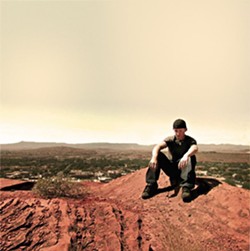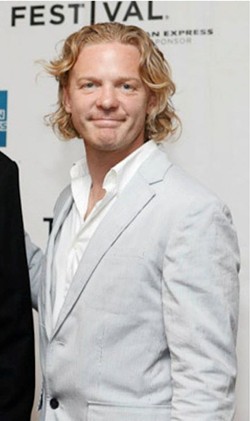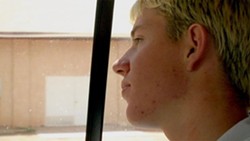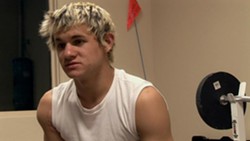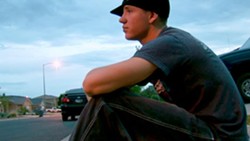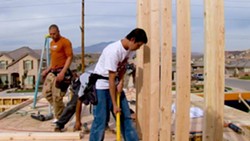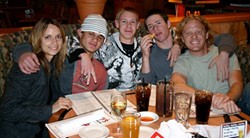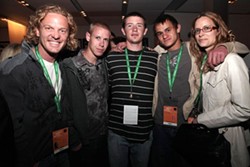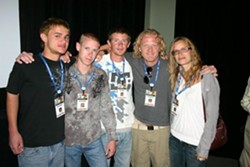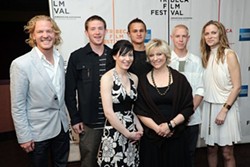Tuesday, November 29, 2011
Sons Of Perdition
Posted By Gavin Sheehan on November 29, 2011, 10:00 AM
Last year, the documentary film Sons Of Perdition debuted at the Tribeca Film Festival, causing one of the fastest sell-out shows in the festival's history --- The film centers around the lives of teenagers who had been kicked out of the FLDS Church by Warren Jeffs, looking both at the lives they once lived in the polygamist community in Colorado City, Ariz., and the ones they're currently trying to shape into their own while living in Salt Lake City.
After much press exposure and praise, the film finally comes to DVD today. To mark the release, we sit down with co-director Tyler Measom about the film, from beginning to release and all the festival coverage after, plus his thoughts on local filmmaking and a few other topics.
Tyler Measom
Gavin: Hey, Tyler. First thing, tell us a bit about yourself.
Tyler: I was raised in a big-ass, happy Mormon family in the lovely hamlet of Pleasant Grove. I’m a single father of a witty and charming 12-year-old man-child who is wise enough to have no interest in being an independent filmmaker. My career has given me the good fortune of traveling the world, but there are still many beaches and mountains yet to see. I absolutely love living in Salt Lake and am thankful every day that bars no longer require memberships.
Gavin: What got you interested in filmmaking and what were some of your favorite films growing up?
Tyler: Other than the unrealistic flirtations of rock stardom and Chicago Cubs outfielder, being a filmmaker was pretty much the only thing I really wanted to do. I remember watching Raiders Of The Lost Ark at the age of 10, and without really knowing that a director was a real profession, I elected to be one -- pretty heady goal for a youngster growing up in small town Utah.
Gavin: Did you take any courses in filmmaking in college, or were you more self-taught in the art?
Tyler: I spent a couple of years at UVSC [Utah Valley State College, now Utah Valley University] but there weren’t really any classes for film at the time. What I did do was watch every movie I could and read every film book that I could get my hands on. This seemed to fit my style better. I recall having a roommate who went to BYU film school, and he was required to watch Battleship Potemkin with the sound off and write a paper about it. Me, I would rather study the finer points of Caddyshack by viewing it for the eighth time. I soon started working as a crew member on various film sets, and after making a few short films, I started directing commercials. In 2006, I produced a feature film entitled TAKE that starred Oscar nominees Jeremy Renner and Minnie Driver.
Gavin: For this film, you worked with filmmaker Jennilyn Merten, with whom you came to share directing duties. When did you and Jennilyn first meet and eventually become friends?
Tyler: We met in 2004 at the old Sugar House Coffeeshop (now a mud pit). I blatantly picked her up, and after a few months of unsuccessful dating, we remained friends and collaborated on various corporate and commercial projects. I love making commercials, but they are rather unfulfilling and we yearned to do something a bit more important than grocery-store ads. We went to a documentary screening at Sundance and agreed that it would be a noble quest to make a documentary. Little did we know that that small decision would encompass the next six years of our lives. Jennilyn has since dropped out of her Ph.D. studies at the U and has moved to Brooklyn to make films among the other thousands of doc makers there.
Gavin: How did you find out about the FLDS over the years and the issues coming out of Colorado City, and what made you want to learn more about what was happening?
Tyler: Living in Utah, the subject of the FLDS and the Lost Boys wasn’t really a secret; it was often in the news. Regardless, it was quite shocking to find out about what was going on in right here in our own state. We did as much research as possible, but we really didn’t realize the extent of abuse and crimes occurring down there until we got it firsthand from those who had experienced it.
Gavin: You both stated that you left the LDS Church and became ex-members. How did that affect your lives as well as your views on what was happening down south?
Tyler: Leaving the LDS faith was an incredibly difficult and trying process, one that took years of thinking and studying. When I finally did break free from the mental constraints of the church, I was amazed at how life was polished with a new sheen. So, when we heard about teenagers being exiled from the FLDS community, we knew there was more to the story than kids simply trying to adjust to a new life. We recognized a story with big social and political interest, but also one we'd been struggling to share ourselves: What does it mean to "lose your religion" -- to leave everything behind in a frightening search for personal freedom and belief? We knew that these boys were struggling with the fear of going to hell, which can be quite a visceral and horrible place. This is the tale that we were interested in telling, the drama of leaving Colorado City in your mind.
Gavin: How did you go about planning the initial story and what did you intend to cover and document?
Tyler: We actually went into the film with a bit of blind ambition, hoping to get certain elements but really just moving where the story led us. We actually followed a number of characters who don’t make it in the final film, and for a few months we were highlighting the social workers, but ultimately we just made it primarily about the three boys. We stuck with them and told the story through their eyes. I think going into the film without any preconceived story lines made the filmmaking process a more fluid and evolving one. It made for a better film.
Gavin: What led to meeting the teenage boys who are featured in the film, and how long did you film and interview them?
Tyler: We met a number of exiled teenagers through a social worker, but none of them really had what we were looking for in characters. After about four months, we met Sam, Bruce and Joe, and we knew immediately that their stories were perfect for the film. Each of them was fresh faced and innocent but still carried the weight of their upbringing with them. Initially, they weren’t really interested in being a part of the movie, but we quickly became their friends and they trusted us with their story. Two and a half years after we met them, we were still pointing the camera in their faces. Even today, we are still great friends and visit often.
Gavin: To say it's a subject with risk is a bit of an understatement, especially when you hear stories of people and media being threatened who come near the town. Were you aware of the possible danger while filming down there?
Tyler: Warren Jeffs had a roving group of men constantly trolling the streets looking for anything strange. From the first moment we entered Colorado City, we were tailed by large, tinted-window vehicles. Everyone in that town drives either a white van or a white truck, and there we were driving the streets in a tan Volvo. Not hard to spot the outsiders. I actually got arrested while filming in Colorado City. The polygamist officer wanted information about one of the exiled teens in the film and I wouldn’t tell him, so I was arrested for “misleading an officer.” Cuffed and stuffed, I was. They threw me in the police car and there, taped on the dashboard, were pictures of Joseph Smith and Warren Jeffs. I spent a few hours being questioned in the tiny police station and then they let me go. Even now, if I go down there, they follow and take pictures of me, for whatever reason.
Gavin: Over the course of the film, we see these boys experience things they'd never seen or been told about. It's described in the film as taking a Somalian kid to downtown L.A. What was it like for you capturing these experiences on film and how did it affect you as a filmmaker?
Tyler: It became quite fun to introduce these teenagers to things that we have known about for years. We would take them to restaurants, museums, ballgames and movies. Growing up, the only music they could listen to was approved by Warren Jeffs, so, needless to say, they missed out on a lot of great tunes. I once used a four-hour drive from St. George to Salt Lake to give them the full history of rock and roll, from the blues to the Beatles to U2 to Nirvana to Kings of Leon, courtesy of my iPod. We then tackled my DVD collection. But outside of the pop-culture introductions, it was great to see them become accustomed to different faiths and races. The kids were raised to believe that black people are evil, and one day I introduced them to my black friend, who promptly smiled, shook their hands and joked around with them. It blew their minds -- years of misleading beliefs were reversed in one brief moment. That is something I will never forget. It’s not in the film, but we once filmed a 24-year-old ex-wife of Warren Jeffs arguing with someone that the United States itself was the world. She was defiant until someone placed a globe in front of her. Imagine living that long and not knowing that the world is round! Sadly, that lack of a proper education still occurs in the FLDS, and our do-nothing state government is turning a blind eye.
Gavin: I read that on occasion it was difficult getting the kids to be candid around the cameras. What issues did you have to deal with and how did you counteract that to get them to open up?
Tyler: These boys were raised to not speak up or share their feelings, so it was difficult for them to open up to a couple of strangers. But we knew that building trust was essential prior to any filming. We learned quickly that a small crew was critical to getting the character-driven intimacy we wanted for the film. Sometimes we sacrificed picture and sound quality to gain access to incredible moments and events, but those gritty stories, escapes and confrontations simply reiterated the reality of our subjects' lives.
Gavin: During your time filming, what was the one experience that truly touched you, shocked you or hit home in some way?
Tyler: There is a very dramatic scene in the film when a 14 year-old-girl escapes from Colorado City. She had been threatened with an arranged marriage and was being kept out of school by her abusive father. After she escaped, we helped to find her a safe house, took her to get a new wardrobe, and she had hopes of being enrolled in her first public school. However, that same evening, we watched as she went back into the arms of the FLDS. It was exhilarating to be a part of this event and to document it. However, it wore us down emotionally to know that this girl was going back to a very abusive environment. Of course, I won’t tell you what eventually happened; suffice it to say that it is rather exciting and in the film.
Gavin: When filming was finished, what was the process like putting everything together while keeping an eye on the situation at hand for possible updates to the work?
Tyler: The story itself is a difficult one to tell, especially with the immense backstory concerning the community, the history of the church and Warren Jeffs. After filming for over two years, we had hundreds of hours of footage that needed to be compiled into 85 minutes. Needless to say, editing the film was an exhausting experience that ended up taking over a year. Also during this time, we continued to film the kids and get additional interviews to round out the story. Because we were so close to the story and the footage, we would often have rough cut screenings for various filmmakers and professionals. This is something that I can’t stress enough for filmmakers. Show the film often during the rough-cut stage -- the feedback that you receive is invaluable. In fact, after the film played at over 20 film festivals, we went back in and did a re-edit, as we found that audience members were asking the same questions during the post-screening Q&A sessions. We also fixed a few issues that critics would bring up in reviews of the film. It’s been said that a documentary is never finished, merely abandoned.
Gavin: When it was done, did you immediately start looking for a distributor, or were you more interested in going the film-festival route?
Tyler: Many distributors had an eye on the film while we were in post-production and they would often inquire about the progress of the piece. BBC acquired the British television rights early in the editing process, but we still didn’t have a domestic distributor when we were accepted in Tribeca. When the Oprah Network bought Sons Of Perdition, we happily promoted the film on the festival circuit for the next year and a half.
Gavin: You were accepted into IDFA, Silverdocs, Austin International and, most prominently, the Tribeca International Film Festival. What was the experience like for both of you being a part of these festivals and seeing the audience reactions?
Tyler: Overall, Sons Of Perdition played at over 45 film festivals, from Akron to Amsterdam. One of the fringe benefits of making a film is traveling to festivals. The festival circuit is quite addicting, because, as an artist, it is nice to receive commendation from audiences, but it is also wonderful to meet other filmmakers. Also, the drinks are free. When we premiered at Tribeca, the film was a huge hit. We sold out four screenings in three hours, and when they added a fifth, it sold out, as well. There were lines hundreds of people deep trying to see the film, and Robert DeNiro himself called it one of his favorites from the festival. So it was wonderful to have the attention after years of struggling to make this film. We were fortunate enough to bring the three boys from the film to New York for the festival. That was a sight to see, three polyg kids in NYC. They were rock stars for a week, and they definitely partied like it.
Gavin: As already mentioned, the film also got a lot of promotion from Oprah Winfrey and ended up being played on her network. What was it like having that kind of media behind you promoting this film?
Tyler: There are hundreds of independent documentaries produced each year, and many of these films never see a distribution deal, so to have a broadcaster take an interest in our film was wonderful in and of itself. But to have a media maven like Oprah single out Sons Of Perdition and put her name on it means a whole lot more. Also, our investors were quite pleased.
Gavin: After it came out and was officially in the public eye, what kind of reaction did you receive from members of the LDS Church, and have you heard of any kind of official stance from them on the film?
Tyler: Many members of the LDS Church are so accustomed to their religion being scrutinized and mocked by the media, they naturally assume that Sons Of Perdition is merely another anti-Mormon film. But upon watching the film, most Mormons are happy that we differentiate between the mainstream church and the fundamentalists. But the fact of the matter is, many Mormons won’t view Sons Of Perdition because it is rated R, for language. However, for the DVD, we just edited a version of the film that excludes all of the cuss words. Audiences will have a choice between the standard version and the “family-friendly” version. To date, the church itself has not released any statement about the film, and they likely won’t. Sons Of Perdition has very little to do with the Mormon Church; it is more about the boys and Warren Jeffs.
Gavin: Subsequently, have there been any comments or fallout from members of the FLDS about the film?
Tyler: I did have a rock thrown through my front window shortly after the film came out. I suspect it was the FLDS, but it also could have been any number of ex-girlfriends. The FLDS don’t really attend film festivals, so it’s not likely that they have viewed the film. But I hope they do watch it -- they might like it. The ideal situation would be to get a copy to Warren Jeffs, and why not? He is the star of the film.
Gavin: The film comes out on DVD this week. Does this mark the final chapter for the film in your lives and minds, or is there something else on the horizon for it?
Tyler: This film has been a major part of our existence for years, and it likely always will be. But yes, the majority of the film work is over. However, we continue to fight against the ills of polygamy and help the teens and women who have left the practice. We teamed with a fantastic nonprofit organization that offers assistance to polygamy’s exiles, and together we are doing quite a bit of wonderful work. This past year, FLDS leader Warren Jeffs was convicted of rape in the state of Texas. We worked very closely with the Texas Rangers and Texas Attorney Generals to help build a case against him. In fact, we introduced many key witnesses who testified during the trial. It’s one thing to make a documentary pointing out societies ills, but it is quite another to actually do something about it. We are proud of that. Now, if we can only get our own attorney general to do something about the fact that hundreds of children in his own state are being systematically raped and being kept from an education.
Gavin: Moving to local filmmaking, what’s your opinion of the Utah film scene, both good and bad?
Tyler: Every large city has its own unique film community, but what sets Utah filmmakers apart is their strict work ethic. It’s not enough anymore to be creative, or to simply have an idea and a camera package. One must work nights and weekends to make it in this industry, and there are a great number of local filmmakers who do just that. I think it can also be said about the artists and musicians in this town that we work harder than most. I suspect it comes from our industrious Mormon upbringing.
Gavin: Is there anything that you think could be done to make it more prominent?
Tyler: I appreciate that the local lawmakers have given tax breaks and incentives to motion pictures in the state, but most of those funds are allocated towards large Hollywood films and not to the home-grown film community. It would be nice to see more grants and funds available that enable local filmmakers to get a film off the ground. But really, the only thing that will make the Utah film scene more prominent is to simply make better films.
Gavin: Are there any local directors or production companies you feel are at the top of their game?
Tyler: Geralyn Dreyfous, who is also the founder of the Utah Film Center, is renowned throughout the U.S. for her documentary work. She’s an incredibly connected producer and we are very lucky to have her in this state. Duane Andersen is one hell of a resourceful producer who has made some truly great low-budget indies including Surrogate Valentine and White On Rice. Of course, Jared Hess of Napoleon Dynamite is talented. and now his wife, Jerusha, co-writer of Napoleon Dynamite, is directing a feature, so watch out for her. Ryan Little continues to pump out quality films. Documentary maker Joshua Ligairi of Cleanflix is making a new film that should be great. Will all the great film schools here in Utah, I wouldn’t be surprised if we see a great, young, local director make a national name for him/herself very soon.
Gavin: Since we're approaching the season, what are your thoughts on the film festivals that come through every year, and are there any changes you wish you could make?
Tyler: The Sundance Film Festival is the largest independent-film festival in the world and one of the premiere cultural events in the country. We are very fortunate to have it right here in our backyard. However, I’m continually amazed at how few Utahans attend the fest. It’s a shame. The Salt Lake Film Festival is still in its infancy, but it is rapidly becoming a fantastic realm for indies and docs. It will only continue to grow, and I, for one, am pleased to see a burgeoning festival in our city.
Gavin: What have you both got planned for your next films, and what can we expect from you both going into next year?
Tyler: Jennilyn and I are making another documentary entitled Movers and Shakers, about Jennilyn’s personal struggle with Parkinson’s disease while profiling other individuals who live powerful lives despite having the disease. Another doc I’m directing is a fantastic piece about the former magician turned professional skeptic, James “the Amazing” Randi. I am truly in love with this film and can’t wait to see where it goes. Both films are in the production stage, and we are constantly soliciting funds to continue to process. As well, I am planning a narrative feature about a bored housewife who, after becoming allergic to the sun, goes out at night and discovers a new world in the darkness of Salt Lake. I am hoping to shoot that film sometime next year.
Gavin: Aside from the obvious, is there anything you’d like to plug or promote?
Tyler: We would love to push people to our Website to buy the DVD. That way, it benefits the filmmakers and the kids in the film, instead of Wal-Mart. Also, Holding Out Help is the nonprofit that helps the kids. They are in need of assistance.
| Follow Gavin's Underground: |
On Topic...
-
Film Reviews: New Releases for April 19
The Ministry of Ungentlemanly Warfare, Abigail, The Beast, Hard Miles, Sasquatch Sunset and more
- Apr 19, 2024
-
Film Reviews: New Releases for April 12
Civil War, Escape from Germany, Coup de Chance, Hundreds of Beavers, La Chimera, Sting
- Apr 11, 2024
-
Film Reviews: New Releases for April 5
Monkey Man, The First Omen, Wicked Little Letters, Girls State, Scoop, Exhuma
- Apr 4, 2024
- More Gavin's Underground » More Culture »
More by Gavin Sheehan
-
Gavin's Underground: End Of An Era
Nine and a half years of local entertainment blogging comes to an end.
- May 26, 2017
-
Torris Fairley
A quick interview with the up-and-coming SLC-based comedian.
- May 25, 2017
-
Cirque Asylum
A look into the dance school teaching unique forms of aerial arts.
- May 24, 2017
- More »



